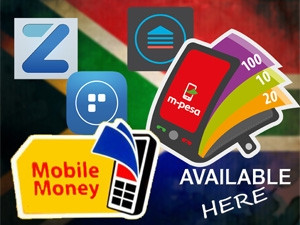
SA is seeing a flurry of activity in the mobile payments space, but the environment is still in a relatively fledgling phase that lacks regulation and standardisation across platforms - a reality industry observers fear may have a negative impact in terms of adoption by retailers and consumers.
At the moment, says World Wide Worx MD Arthur Goldstuck, mobile payments remain at a developmental stage, with experimentation still being the guiding impulse - and being beaten by the competition the primary fear. "There are no regulations requiring standardisation in mobile payments."
Roan Murray, CEO of payment solutions company Switching House, says it has been his mission for over a decade now to implement a single standard for mobile payments across the board in SA. "The industry would greatly benefit from a scenario in which all players' platforms are integrated to the point where we would see vendors advertising 'mobile payments accepted here' - instead of 'M-Pesa [for example] accepted here'.
"The mobile payment space is going through an explosion of activity at the moment [and] the activation of different applications and technologies is natural, but the fact that all the players are implementing different user experiences to get the same result is the main hindering factor [to a single standard]."
Murray says the industry needs to get together and get organised in order to approach the regulator "to sanction a specific rule set that is tailor-made for this very new and unique way of payment processing".
Goldstuck says interoperability would present an initial plus, leading to the greater benefit of widespread adoption. "However, that is unlikely to happen in the near-term due to the developmental and experimental nature of the industry."
Industry initiatives
Murray notes the Payments Association of SA regulates third-party payment providers as a whole, including all tender types in the physical and virtual realm. "They 'police' entrants in the payment space as an affiliated body to the SA Reserve Bank [but] the practical implications of using the mobile phone as the payment device have not been specified at this moment in time."
He says negotiations are ongoing between Switching House - which is a payments enabler, rather than a customer-facing entity - with regard to the integration of platforms, but this is a lengthy process.
Industry observers have pointed to the power of card associations and the sizeable power of the banks (which jointly own the payments infrastructure) as hindering the uptake of mobile money in SA.
Julie Tregurtha, head of database and technology and mobility sales for Southern Africa at SAP Africa, says there are a number of factors that have deterred the establishment of a single standard for mobile payments, including:
* The challenge banks and telecoms providers' have on agreeing on models for collaboration.
* Lack of interoperability: consumers expect a payment means to be universally accepted, while mobile payment providers still compete on the service.
* Lack of clear regulation: financial regulators are sometimes unclear of the way in which, or whether at all, mobile payments fall under the regulations. Many have put in place a requirement to be a bank or at least have an e-money institute's licence, challenging telco-led solutions.
* Lack of international harmonisation: regulation is different by country. There is not one international licensing authority that would allow a payment provider to easily operate everywhere.
* Complexity and the adoption of technology: near-field communication (NFC), for example, has lacked adoption by the hardware manufacturers for a long time. Besides this, a traditional NFC solution requires at least nine business participants sharing the small margins on payments. New alternative technologies such as Bluetooth low energy (iBeacon) or host card emulation are promising to overcome this, but come with other challenges.
"SAP has worked with around 100 clients globally to provide local and international mobile banking, payments and remittance solutions. With our partners we continue to work on ways to overcome the above challenges - both operational and technical," adds Tregurtha.
Share